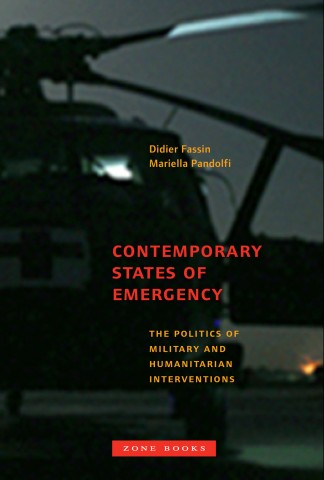The Politics of Military and Humanitarian Interventions
In recent decades there has been a trend toward aligning or integrating military and humanitarian action. It has taken the form of militaries wanting to win hearts and minds, on one side, and humanitarian actors calling for military action on the other. "Contemporary States of Emergency: The Politics of Military and Humanitarian Interventions" (2010), edited by D. Fassin and M. Pandolfi, explores these shifts and their implications. The edited volume presents a range of different topics, three stand out for me.
In the Introduction, Fassin and Pandolfi problematize the scene well: "humanitarian intervention is still a law of the strongest – this is what makes it possible, for there is no question of intervening in Chechnya, Tibet, or even North Korea to protect populations at risk. This relation of forces – and the realpolitik that, highly paradoxically, underlies military and humanitarian government – explains not only why local impulses toward resistance are discouraged, but also why the human cost of intervention is much lower for the intervening forces, even at the cost of placing the populations on whose behalf the intervention is supposedly undertaken in considerable danger: zero deaths among the NATO forces, compared with the five hundred civilians killed by the bombardment in Kosovo in 1999, and, by 2008, more than forty-five hundred deaths among the coalition troops compared with over a million mainly civilian deaths in Iraq since the invasion in 2003." (13-14). For readers interested in an introduction to the topic, this is a worthwhile read.
In my reading, Alex de Waal's "An Emancipatory Imperium?: Power and Principle in the Humanitarian International" is the strongest chapter. The chapter explores two interventions – Somalia and Sudan (Darfur specifically) – and the evolution of humanitarian-military interventions. "For many of the humanitarian advocates of the intervention [Somalia], success was axiomatic – they simply assumed that the U.S. Marine Corps, with its vastly superior weaponry and training, would impose its will on Somalia and save hundreds of thousands of lives of people at risk of starvation. Humanitarian advocacy is all about deriving an "ought" from an "is" – the very label "emergency" is both a descriptor and a prescription for (urgent) action. By the same token whereby human suffering demands an international response, such a response must work. The question of efficacy simply did not arise." (p. 297). The entire chapter is excellent, and recommended for all interested in humanitarian and international action.
Pupavac's "Between Compassion and Conservatism: A Genealogy of Humanitarian Sensibilities" presents a historical contextualization of how justifications are made for humanitarian action. The chapter focuses less on military action per se, but the shifting values that have enabled the intersection. Even if unrelated directly to military action, some points to stir debate include reflections on the development of values within the humanitarian and development sector. For example, "current British aid organizations also evolved in reaction against industrial society. Their philosophy has historically accorded more with Bonham-Carter's aversion to modern industrialization than with Hoggart's affirmation of its benefits for ordinary people. They have been inclined to idealize authentic traditional peasant communities as counterposed to an inauthentic, corrupting industrial society. Anti-industrial sentiments have followed anthropological thinking, which also informed colonial administration" (p. 135). A second example: "Those most likely to be concerned about ethical consumption are among the wealthier social groups with higher rates of consumption. Shopping as social action fits, rather than necessarily opposes, a consumer outlook in which it is difficult to conceive of action beyond consumption. Moreover, ethical consumption may represent a form of conspicuous ethical consumption. Affluent consumers may demonstrate their superior discernment, compared with that of the masses, by means of their organic tastes, expensive foreign travel to novel destinations, and specially sources authentic fair-trade and ecological goods." (p. 143).

